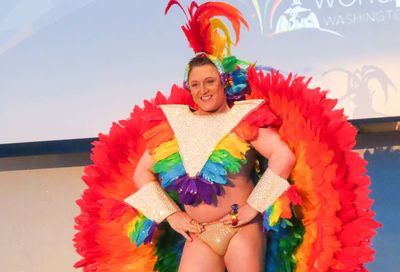Pee Town
A wild, wacky parody of 'socially important,' pretentiously encumbersome musical theater, 'Urinetown' is a joyous whiz
Let’s get this out of the way right up front: Urinetown is not what you think it is. Despite whatever tawdry, profane images your mind unhappily (or, depending on what you’re into, happily) musters, Urinetown isn’t it. It’s not a John Waters musical. Not to imply that musicals based on Waters material are comprised of trash and filth and defecation — quite the opposite, frankly, if you take the candy-coated, pop-infused entity that is Hairspray into account. But the greater point is: Urinetown is not — I repeat, not — shock theater.
And yet it jolts you right out of your seat.
”Urinetown,” explains the show’s narrator, a policeman named Officer Lockstock, ”is kind of a mythical place, filled with symbolism.” (To reveal much more about the nature of the place would spoil the evening’s best first act joke.) Lockstock later tells us that we are not to expect daisies and buttercups and sunshine from this song and dance encounter. ”Dreams only come true in happy musicals,” he says, a sinister grin plastered wide across his face. ”Dreams are to be crushed.”
 Plunging into romance: Driscoll and Gartshore (Photo by Carol Pratt) |
And plenty of dreams are crushed over the course of the show’s fast-paced two and a half hours. Crushed and destroyed. All in good fun.
The show’s authors, Mark Hollmann and Greg Kotis, have essentially concocted a wild, wacky parody of ”socially important,” pretentiously encumbersome musical theater. They ape the very beast that gives their show momentum, such as in one brilliantly funny moment in which characters break into a gospel-sopped number, the failsafe ”we need an instant showstopper” mechanism in countless Broadway musicals. If Urinetown has a greater political point, it hardly matters given the sheer, over-the-top fun with which it’s presented. We’re not meant to think. We’re meant to smile. It’s that simple. It’s that pure.
Director Joe Calarco knows this, and his production at Signature is a joyous whiz. This is a director who has never been pee shy, so to speak, and he pulls out the stops with a gusto tantamount to a tornado slamming into Kansas and sweeping Dorothy and her dog and Auntie Em and everyone else in the state into another world. Along with the gifted choreographer Karma Camp, who turns in her most phenomenal work to date, Calarco mines the material for as many theatrical references as he can muster. Starting with a foundation of Kurt Weill, he lavishly piles on the references — everything from Les Miz to Our Town to Fiddler on the Roof and West Side Story. It’s like an intelligent, genuinely witty Forbidden Broadway. And yet, you don’t have to be a rabid theater fan to enjoy Urinetown, mainly because Hollmann and Kotis’s music and lyrics are such clever, canny wonders, performed to the top of melodrama mountain by a cast that well understands the following credo: When you mug alone, you look like an idiot, but when you mug in perfect unison, you create a work of art.
Set in a distant future that looks oddly like our own distant Depression Era past, courtesy James Kronzer’s squalor-infused, wide-open set and Anne Kennedy’s ragtag costumes, Urinetown finds the citizens of a major metropolitan area caught up in an wrenching 20-year-long drought. Public urination has been made illegal — the penalties if caught are surprisingly dire — and the corporate fat cats, represented by Caldwell B. Cladwell (Christopher Bloch), capitalize on humankind’s most basic of needs by maintaining ”public amenities,” forcing the masses to pay to do their business. Not enough money today? Tough, hold it in. Those who disobey are carted off to Urinetown.
|
Eventually, the overtaxed bladders take a stand — led in a spontaneous revolution by a strappingly handsome, foolishly heroic custodian named Bobby Strong (Will Gartshore). They rise up against the corporate toilet, but the results are not what you might expect. Remember, we were informed early on ”This is not a happy musical.”
The show plays out like a madcap, mustache-twirling melodrama. It’s as broad as a barn and as delicately nuanced as a fine oil painting. That’s a hard balance to achieve, and yet Calarco pulls it off, thanks to a clear sense of vision — he knows exactly what he wants out of this show and he delivers — and song and dance material that is, in a word, inspired. With lyrics like ”Let the blood flow like Campari” and ”Someday I’ll meet someone whose heart joins with mine/Aortas and arteries all intertwined,” how can you go wrong?
Well, you could. But this troupe, thankfully, doesn’t. Gartshore, whose rich, gorgeous tenor is as clear and forceful as ever, is the show’s centerpiece. Gartshore, whose buffed up chest is bared long and often in frequent and funny shirt-ripping scenes, gives the performance of an already amazing career. He’s matched by Erin Driscoll, as Cladwell’s daughter Hope, a relative unknown who gives the kind of performance here that folks used to call starmaking. Driscoll, who bears an uncanny resemblance to Reese Witherspoon, is a consistent source of surprise and revelation, not to mention the proud owner of set of pipes that rattle the rafters.
Christopher Bloch starts out strong — there’s a juicy, blissful malevolence to Cladwell — but strays too far by show’s end into a territory best defined as a little too rodent-like. Other standouts include Donna Migliaccio, as the scowling proprietress of a public bathroom, Stephen Schmidt as Lockstock, and Jenny Sokolowski, who consistently steals the evening as Little Sally, a pigtailed, ragdoll-clutching waif who questions absolutely everyone about absolutely everything and is ultimately responsible for a post-curtain moment that ends the evening on an uproarious high note. (Stay in your seats after the curtain call — it’s worth the extra ninety seconds.)
There aren’t many shows where big dance numbers utilize toilet plungers as props. Then again, there aren’t many shows like Urinetown. It works overtime to earn its status as not just a hit, but as a piece of original, sharply satiric theater that will make you laugh till you… till you… oh, why the hell not? Till you pee.
Support Metro Weekly’s Journalism
These are challenging times for news organizations. And yet it’s crucial we stay active and provide vital resources and information to both our local readers and the world. So won’t you please take a moment and consider supporting Metro Weekly with a membership? For as little as $5 a month, you can help ensure Metro Weekly magazine and MetroWeekly.com remain free, viable resources as we provide the best, most diverse, culturally-resonant LGBTQ coverage in both the D.C. region and around the world. Memberships come with exclusive perks and discounts, your own personal digital delivery of each week’s magazine (and an archive), access to our Member's Lounge when it launches this fall, and exclusive members-only items like Metro Weekly Membership Mugs and Tote Bags! Check out all our membership levels here and please join us today!




















